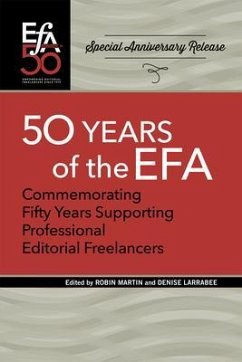The Editorial Freelancers Association (EFA) looks very different today than it did ten years ago, and even more so than twenty-five years ago, when it last published a booklet commemorating an anniversary of the group.
This look back at the EFA's history in this commemorative booklet shares just a bit of what has gone into building and maintaining the stable foundation on which the nation's largest and oldest professional association of editorial freelancers will move into the future. As a look back, it reveals how the EFA has reflected the changing world. For example, as new technologies develop, the EFA makes use of them to better communicate with and support members. Not everything at the EFA changes as quickly as the world, as this group of busy freelancers - all volunteers in their roles with the EFA - can attest, but the movement forward continues in ways that best support their growing membership.
This is not only a milestone year for the organization; the EFA has plenty to celebrate within our current programs, thanks to our dedicated volunteers - who are too numerous to name, but still represent a very small percentage of our membership.
Before PCs or Post-It notes, the EFA formed with a focus on providing a place for members to socialize and exchange information. In the early years, the group of freelancers did not have a name and met secretly to avoid exposing all the members to potential blacklisting and other sanctions. In 1981, it was incorporated. By the 1990s, people were joining as a way to learn how to be a better freelancer, to be smarter about business: finding clients, dealing with clients, presenting oneself better, protecting oneself better, gaining a greater sense of the field and the issues relevant to freelancing.
Throughout the challenging 2020 year, during which the COVID-19 pandemic left many freelancers vulnerable to the economic slowdown and other unknowns, the EFA remained an active organization, continuing work in service to its members. This longtime tradition of support is celebrated in this booklet.
Since its twenty-fifth anniversary in 1995, the EFA has seen substantial growth: the size of its membership went from 1,000+ to 2,800+; the amount of its expenses increased from $127,099 to $375,489; and the number and breadth of benefits it offers its members grew. In 2002, there were seven regional chapters, in 2020 there are thirty. This booklet highlights changes such as these over the breadth of the organization's half century of existence.
This assemblage of recollections of the past and stories for the future presents the history of the EFA through a lens of the benefits the association has offered its members over the years, and will be informative for both newer members and veterans of the organization.
Stories include those of J. P. Partland, who was an EFA co-executive from 2000 to 2016; J. Trumbull Rogers (1939-2013) who served as EFA co-executive director and treasurer, and initiated the Job Phone service, precursor to today's Job List; Martin Kohl (1944-2003) an active EFA member who served as a member at large on the board in 1994-1995, wrote an EFA booklet and reported often for the Freelancer; and Elliott Linzer, who earns his living as a freelance indexer and has been a member of the EFA since 1976. An iteration of the 2020 Co-Executives Annual Report, written by current co-execs William J. Keenan and Christina M. Frey, appears within, as well as a rundown of EFA benefits written by EFA board members Robin Martin and Denise Larrabee, who co-edited and prepared this booklet for publication.
This look back at the EFA's history in this commemorative booklet shares just a bit of what has gone into building and maintaining the stable foundation on which the nation's largest and oldest professional association of editorial freelancers will move into the future. As a look back, it reveals how the EFA has reflected the changing world. For example, as new technologies develop, the EFA makes use of them to better communicate with and support members. Not everything at the EFA changes as quickly as the world, as this group of busy freelancers - all volunteers in their roles with the EFA - can attest, but the movement forward continues in ways that best support their growing membership.
This is not only a milestone year for the organization; the EFA has plenty to celebrate within our current programs, thanks to our dedicated volunteers - who are too numerous to name, but still represent a very small percentage of our membership.
Before PCs or Post-It notes, the EFA formed with a focus on providing a place for members to socialize and exchange information. In the early years, the group of freelancers did not have a name and met secretly to avoid exposing all the members to potential blacklisting and other sanctions. In 1981, it was incorporated. By the 1990s, people were joining as a way to learn how to be a better freelancer, to be smarter about business: finding clients, dealing with clients, presenting oneself better, protecting oneself better, gaining a greater sense of the field and the issues relevant to freelancing.
Throughout the challenging 2020 year, during which the COVID-19 pandemic left many freelancers vulnerable to the economic slowdown and other unknowns, the EFA remained an active organization, continuing work in service to its members. This longtime tradition of support is celebrated in this booklet.
Since its twenty-fifth anniversary in 1995, the EFA has seen substantial growth: the size of its membership went from 1,000+ to 2,800+; the amount of its expenses increased from $127,099 to $375,489; and the number and breadth of benefits it offers its members grew. In 2002, there were seven regional chapters, in 2020 there are thirty. This booklet highlights changes such as these over the breadth of the organization's half century of existence.
This assemblage of recollections of the past and stories for the future presents the history of the EFA through a lens of the benefits the association has offered its members over the years, and will be informative for both newer members and veterans of the organization.
Stories include those of J. P. Partland, who was an EFA co-executive from 2000 to 2016; J. Trumbull Rogers (1939-2013) who served as EFA co-executive director and treasurer, and initiated the Job Phone service, precursor to today's Job List; Martin Kohl (1944-2003) an active EFA member who served as a member at large on the board in 1994-1995, wrote an EFA booklet and reported often for the Freelancer; and Elliott Linzer, who earns his living as a freelance indexer and has been a member of the EFA since 1976. An iteration of the 2020 Co-Executives Annual Report, written by current co-execs William J. Keenan and Christina M. Frey, appears within, as well as a rundown of EFA benefits written by EFA board members Robin Martin and Denise Larrabee, who co-edited and prepared this booklet for publication.
Dieser Download kann aus rechtlichen Gründen nur mit Rechnungsadresse in A, D ausgeliefert werden.









